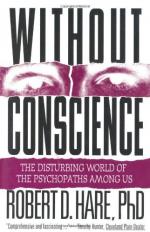
|
| Name: _________________________ | Period: ___________________ |
This test consists of 15 multiple choice questions and 5 short answer questions.
Multiple Choice Questions
1. Why are nurturing women ideal prey for psychopaths?
(a) They are ignorant.
(b) They will take a lot of abuse if they think they can help.
(c) They believe they are invincible.
(d) They are good cooks.
2. How did Clifford Olson see himself during his trial?
(a) As a scapegoat.
(b) As a celebrity.
(c) As a hero.
(d) As a victim.
3. What causes suffering for a psychopath?
(a) Remorse for his own behavior.
(b) Grief at his victims' unhappiness.
(c) Not getting what he wants.
(d) Guilt.
4. What is the most heart-wrenching situation involving psychopathy?
(a) When a pschopath has deceived you in a romantic relationship.
(b) When there is a psychopath in your family.
(c) When a psychopath has taken your money.
(d) When a psychopath is managing your trust fund.
5. How do psychopaths see themselves in relation to others?
(a) They see themselves as the equal of anyone.
(b) They see themselves as superior beings.
(c) They never think of themselves in relation to others.
(d) They see themselves as inferior beings.
6. What is unusual about the brain function of psychopaths?
(a) Integrated language processes.
(b) Unilateral language processes.
(c) Interrupted language processes.
(d) Bilateral language processes.
7. What is the most distressing aspect of increasing juvenile crime?
(a) The ever-younger age at which crimes are committed.
(b) Increasing cooperation among young offenders.
(c) Increasing disregard for social rules.
(d) Increasing hostility toward adults.
8. What group is a frequent source of victims for psychopaths?
(a) Lonely women.
(b) Naive women.
(c) Older women.
(d) Unmarried women.
9. Why do the victims of psychopaths often have trouble convincing others?
(a) Psychopaths paint the victims as the real culprits.
(b) Their stories are too extreme to be believed.
(c) The victims are often wrongdoers themselves.
(d) The victims are not convincing speakers.
10. Who normally serves on parole boards?
(a) Politicians.
(b) Criminal justice professionals.
(c) Political appointees with few relevant qualifications.
(d) Mental health clinicians.
11. What event in the life of Lawrencia Bembenek did 300 people gather to celebrate?
(a) Her acquittal.
(b) Her conviction.
(c) Her escape from prison.
(d) Her extradition to the U.S. from Canada.
12. Why do clinicians hesitate to label a child psychopathic?
(a) Early labelling is seldom accurate.
(b) Early labelling can discourage parents.
(c) Early labelling can become a self-fulfilling prophecy.
(d) Early labelling can result in earlier, better interventions.
13. How did a psychopath flatter forensic psychologist J. Reid Meloy?
(a) By quoting from Meloy's published work.
(b) By telling Meloy how impressed he was with his writing.
(c) By telling Meloy he was handsome.
(d) By offering to work for Meloy without pay.
14. How did the congregation of Ed Lopes react to discovering he was actually a thief and murderer?
(a) They rallied to support him.
(b) They were disillusioned.
(c) They were heartbroken.
(d) They were not surprised.
15. What is a typical sign of psychopathic conversation?
(a) Entertaining stories.
(b) Interest in the listener.
(c) Self-contradiction.
(d) Flattery.
Short Answer Questions
1. How is psychological denial a disadvantage?
2. What is a person's best defense against psychopaths?
3. When does the U.S. Supreme Court say expert testimony, such as Grigson's, is admissible?
4. What does the author believe Grigson's approach lacks?
5. How did psychopaths in the prison study of brain patterns respond to emotionally charged words?
|
This section contains 581 words (approx. 2 pages at 300 words per page) |

|




